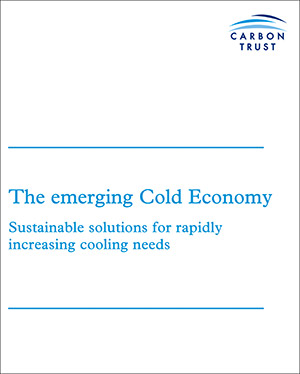UK must invest in “cold economy”
16th February 2015 UK: The influential Carbon Trust claims that the “cold economy” has been neglected and calls for investment in new cooling technologies, research, apprenticeships and training.
UK: The influential Carbon Trust claims that the “cold economy” has been neglected and calls for investment in new cooling technologies, research, apprenticeships and training.
In a new report, The Emerging Cold Economy, the Carbon Trust claims that UK energy policy has until now been too focused on electricity, transport and heat, with cooling receiving little attention in the energy debate so far. This needs to change, it says, because cooling is energy intensive and highly polluting, and demand is booming, so there is an urgent need to make cold more sustainable.
The report highlights the importance of cooling which, it says, consumes up to 14% of the UK’s electricity and costs the UK more than £5bn per year.
Importantly, demand is increasing worldwide, particularly in emerging markets, with one estimate suggesting that by 2030 global demand for cooling could grow by the equivalent of three times the current generating capacity of the UK.
While cooling is vital and demand seems set to rise strongly, the report says there is an urgent need to replace conventional technologies with sustainable alternatives in developed economies and for developing economies to immediately adopt the more sustainable solutions of the Cold Economy.
Using current technologies to meet dramatically increased future demand for cooling will be economically wasteful, the report maintains, and will have significant environmental consequences.
A substantial global business opportunity already exists for novel cooling solutions which are both cost effective and sustainable. Some of the most exciting innovations in both technology and systems-thinking around cold and power are happening in the UK.
The report defines the Cold Economy as the business and environmental value created by the efficient integration of cold into the wider energy system. It highlights greater recycling of waste energy, including waste cold, to supply cooling; using liquid air and other cryogens as energy vectors, to store and deliver cold and power and the development of more efficient technologies, materials and practices.
Britain, it says, appears well placed to capitalise on this market demand , since a suite of clean cold technologies is already in development, and the country has world-class capabilities in cryogenics, engineering, manufacturing and finance.
“Government and industry could make a strategic decision to take advantage of these favourable conditions and secure a global leadership role for the UK in this major potential growth market,” the report states.
But the report warns that success “will depend on joined-up thinking and co-operation among previously disparate organisations, and requires a concerted effort by industry, academia and government to develop, test and deploy novel clean cold solutions”.
The report reveals what is described as the “growing but currently informal hub of clean cold research and expertise centred in the Midlands” – the wide group of companies and research organisations working to develop the liquid air transport refrigeration as the first stage in a new Cold Economy, including Dearman, Hubbard Products Ltd, MIRA, MTC, Loughborough University, and the University of Birmingham Centre for Cryogenic Energy Research, set up with £12 million in government and industry funding. It has also recently appointed a Professor of Power and Cold Economy to further lead the thinking and development.
“Government and industry could make a strategic decision to take advantage of these favourable conditions to attain a global leadership role for the UK as a solution provider in this major global growth market,” the report says.
Read the full report here.







